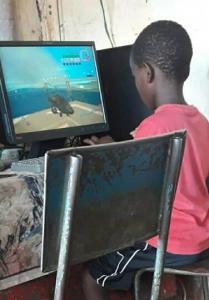
Technology is rapidly transforming every aspect of human life, for better or for worse.
The entertainment industry is synonymous with technology as most innovations are coming in to support it.
Taking advantage of some households’ failure to own entertainment units, entrepreneurial minds kick in and drive some people to offer entertainment at a small fee.

High definition LED television sets which can play movies from memory sticks, DVD players and computers have created a wave of entertainment centres in communities.
Apart from watching films, one can play video games on the television screens.
The television screens have become more attractive to kids because of the games that closely simulate real world activities and some foreign movies that have been translated into Chichewa.
Much as it is good to expose children to technology at an early stage, it has also proved to be a stumbling block to learning.
Some children now prefer spending their time at video show and game centres to being at school.
In Kasungu Municipality, it is common for school children to be seen flocking to video show and game centres on school days.
What starts as a normal school day for the kids is wasted as gaming and watching movies take a greater part of it. Many kids are seen loitering around the municipality during learning hours.
A visit to different video show and game centres within the municipality before schools closed found a number of school children in the age range of 7-12 years in their uniforms.
The game centres attract mostly boys whereas video shows are patronised by both boys and girls.
Lack of serious parental guidance amid inability to enforce laws governing entertainment centres is derailing children’s focus on education.
The situation is leading to moral decay among Kasungu boys as some of them steal the money they pay at the game centres.
Sentiments of a seven-year-old Standard Two learner at Chithiba Primary School found at one of the gaming centres confirm lack of seriousness on the part of parents.
“I like playing games any day I wish to do so. I did not go to school because I wanted to play the games today and my parents did not say anything when I opted to come here and not to go school,” he said.
Zaidi Bwanali proudly owns a gaming centre at Chitete Trading Centre which is right in the middle of the municipality.
Bwanali testified that his entertainment centre receives school going kids from the densely populated areas surrounding the trading centre even during learning hours.
“I know that these kids are supposed to be in school especially in the morning hours. As such, I encourage them to go to school.
“However, when I chase them away, they hang around; since they bring money with them, I allow them to play the games,” Bwanali said.
Bwanali admitted that some of the children who play games at his centre steal money from their parents to pay for the games.
“Some of these children cannot afford to pay for the games every day. As a result, they are compelled to steal from their parents,
“I realised this when I received a number of complaints from the parents,” he said.
But some children found coming out of a video show room at Chitete market claimed that they opt to watch movies whenever teachers send them back home for not complying with school requirements.
“We are not at school because we have not paid development fund and teachers have sent us back.
“Since our parents are yet to source the money, we are here to watch movies and pass time away,” said one of the children.
However, Chithiba Primary School deputy head teacher Charity Ngoma denied sending children back home for nonpayment of development fund.
“We stopped sending them back…because it was disturbing class attendance and assessment,” Ngoma said.
She added that lack of commitment by parents to encourage their children to be in school has contributed much to their tendency to be at video show and game centres.
“Parents are not responsible enough to monitor their children whether they really attend classes or not. Since the children know that they are not monitored, they play truancy,” she said.
A video show room owner Felix Evance said he was aware that the children are neither supposed to be in game centres nor in video show rooms during school time.
He, however, argued there was nothing he could do because they pay him money.
“We are mindful that it is not good for them and it is not allowed. But the children are our major customers and we do not want to lose them by chasing them away,” Evance said.
Kasungu District Education Network (DEN) Chairperson Clifford Kachali lamented that the centres are contributing to violation of the rights of the kids to education.
“As DEN, we condemn this development in strongest terms and kindly advise the owners of game centres to allow the kids play the games only after school hours,” Kachali said.
Kasungu District Education Manager (DEM) Rabson Kawalala said his office had not received an official complaint about the disturbance that the game centres and video show rooms cause to schools.
Kawalala, however, was quick to say that his office and other stakeholders will take vigilant steps to curb the situation.
“My office will engage other stakeholders to control the situation. I call upon teachers and parents to make sure that the pupils are in school and not the game centres,” he said.
Kasungu Municipality Chief Executive Officer Grace Chirwa said the council allows legal businesses to operate at any right place but they do not limit the time of the business.
“As council we cannot stop game centres and video shows because these are small-scale businesses but the owners should not allow children to play games or watch films during school time.
“I call upon teachers, chiefs, parents, the businesspersons to hold hands and amend the existing by-laws to regulate the centers and make sure that they are enforced so that our children learn without any disturbances,” said Chirwa.
By Amos Banda & Amadu Matamando – Mana














